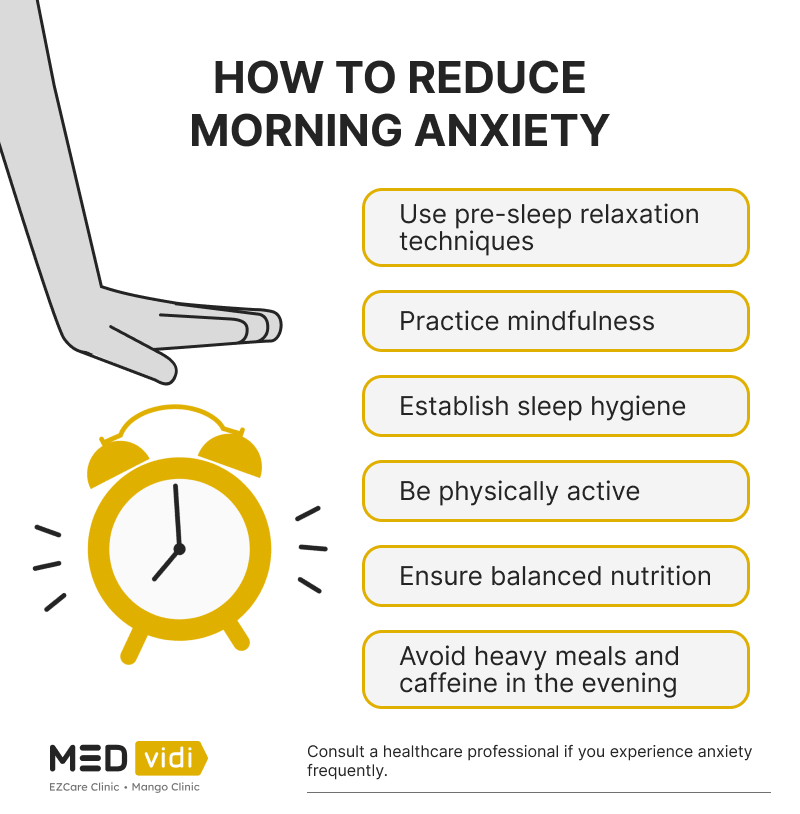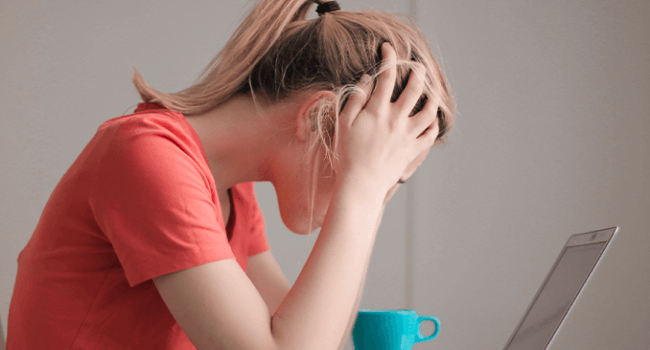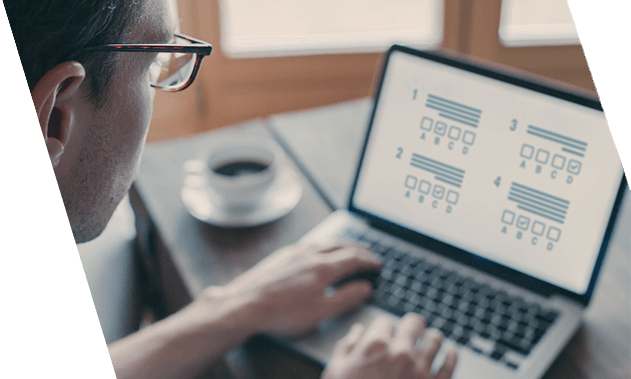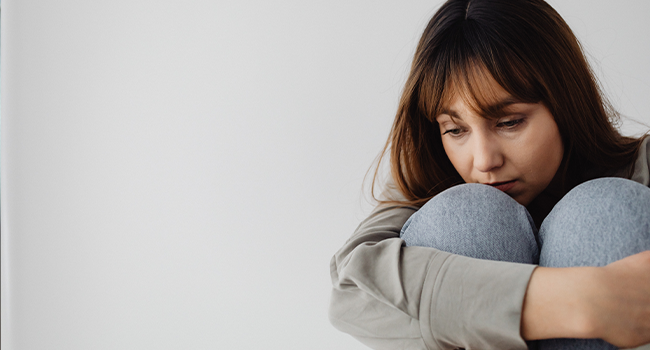For some people, the morning alarm can feel like a warning sign, shocking them awake with a strong feeling of stress and worry. If you experience morning anxiety, it can make your day ahead seem gloomy right from the start. In the long run, anxiety can significantly impact your overall well-being, influencing mental and physical health, relationships, and daily functioning.
This article delves into the complex phenomenon of morning anxiety, unraveling its causes and offering strategies to conquer it. Read on to know how to ultimately facilitate a more tranquil and balanced daily routine.
Seek professional help to reduce morning anxiety.
Morning Anxiety: What It Is?
These symptoms, also connected to generalized anxiety disorder (GAD), may include racing thoughts, difficulty concentrating, tense muscles, or a rapid heartbeat. However, morning anxiety differs from GAD in the onset and duration, as it typically lasts only during the first hour of the day.
You can have morning anxiety symptoms even if you don’t have an anxiety disorder. But it’s not always a medical problem on its own, as it can be triggered by various non-medical factors such as stress, daily challenges, or lifestyle choices. These aspects can cause temporary anxiety in the morning, which doesn’t necessarily indicate an underlying anxiety disorder.
Symptoms
The typical symptoms of morning anxiety are similar to those of anxiety attacks:
- The sensation of anxiety or worry experienced upon awakening.
- Restlessness.
- Racing thoughts.
- Rapid heartbeat.
- Sweating.
- Trembling.
- Trouble concentrating.
- A feeling of impending doom or anxiety.
- Physical symptoms like headaches or stomach pain.
Effects of Morning Anxiety
The impact of morning anxiety extends far beyond the early hours, seeping into every facet of daily existence.
- Morning anxiety can manifest physically, causing increased heart rate, muscle tension, and gastrointestinal discomfort, further adding to discomfort and distress.
- Persistent anxiety in the morning can significantly reduce productivity, making it challenging to focus on tasks and accomplish goals efficiently.
- Reduced productivity and impaired decision-making can result in missed personal and professional growth opportunities.
- Ongoing anxiety in the morning may affect interactions with friends, family, and colleagues, making you irritable, less patient, or withdrawn.
- Morning anxiety can set a negative tone for the day, leading to a cycle of worry and anticipation of future mornings, perpetuating the problem.
To get rid of morning anxiety and reduce the above-mentioned effects, you can refer to relaxation techniques, counseling, and lifestyle modifications. If you experience severe anxiety, it’s recommended to see a mental health professional to restore control over your symptoms and increase overall well-being and productivity.
Possible Causes of Anxiety in the Morning
Anxiety sickness in the morning can be triggered by many factors, encompassing psychological, physiological, and behavioral elements. Following are some of the possible causes that collectively contribute to various anxiety disorders, including the symptoms faced in the morning:
- Stress and worry: Anxiety frequently results from stress and worry about upcoming activities, duties, or obligations. Your thoughts may get overloaded in the morning, causing anxiety if you have a busy day ahead of you or unresolved problems.
- Cortisol level: Cortisol, also known as the “stress hormone,” naturally
peaks in the morning[2] . High cortisol increases have also beenlinked to anxiety[3] in certain people. This physiological reaction may aggravate uneasy feelings. - Sleep quality: Poor sleep or insomnia can mess with your body’s cycle and make you anxious in the morning. Your mind may be more prone to worried thoughts when you don’t receive enough restorative sleep.
- Negative thought patterns: Cognitive distortions and negative thoughts can contribute to morning anxiety. These tendencies may involve overthinking, excessive self-criticism, or catastrophizing (believing the worst will happen).
- Lifestyle factors: Excessive caffeine use, poor nutrition, little exercise, or erratic schedules might affect anxiety levels. For instance,
caffeine[4] is a stimulant that can cause or worsen anxiety. - Underlying mental health conditions: Generalized anxiety disorder, panic disorder, and other mental health illnesses might have morning anxiety as one of their symptoms. A common feature of these diseases is increased vulnerability to stimuli.
- Hormonal imbalances: Some people experience mood changes and morning anxiety due to hormonal fluctuations, particularly women’s during menstrual cycle periods.
- Subconscious stressors: Your subconscious mind may occasionally contain fears and anxieties. These underlying worries could become apparent as you wake up, causing morning anxiety.
- Routine changes: A sudden shift in your daily schedule, place of employment, or personal circumstances might destabilize your sense of security and cause worry when you get up.
See a mental health expert at MEDvidi who will examine your symptoms and offer personalized support and treatment.

How to Prevent Morning Anxiety?
You can use the following methods to cope with morning anxiety. Some of them are evening activities and routines, while others can be used in the morning to reduce the symptoms.
- Before bed, perform relaxing activities like reading, meditation, deep breathing, or mindfulness techniques. Write down your thoughts to help you decompress.
- Avoid using screens (phones, tablets, and computers) right before bed because
the blue light[5] they produce can affect your sleep. - Regularly engage your body during the day, but refrain from strenuous exercise right before bed.
- Avoid eating anything heavy, spicy, or caffeine-rich right before bed. Choose a light snack if necessary.
- Reduce or stop drinking alcohol and caffeine, especially in the evening.
- Maintain a sleeping-friendly environment in your bedroom by making it dark, quiet, and cozy.
- Throughout the day, practice stress-reduction methods like yoga or mindfulness.
- Set a consistent bedtime to achieve a regular sleep schedule.
- The symptoms of low blood sugar can be
similar to anxiety[6] , so having breakfast shortly after waking up may help with morning anxiety. Some foods, such as thoserich in magnesium[7] , can also promote calmness. - Develop a morning routine to reduce anxiety and stress.
Take the first step to ease morning anxiety. Contact MEDvidi’s experienced professionals today to book a consultation. Your well-being matters!
How to Treat Morning Anxiety
Dealing with morning anxiety is not always the case. Sometimes, professional help is needed. Like any mental health issue, treatment for anxiety depends on individual factors and possible underlying causes. Some possible treatment options for intense morning anxiety include:
- Cognitive behavioral therapy (CBT): This structured therapy lets you recognize and alter unfavorable mental beliefs and behaviors that fuel anxiety.
- Exposure therapy: This approach can help desensitize your body’s reaction to anxiety by gradually exposing you to anxiety triggers under controlled conditions.
- Mindfulness-based stress reduction (MBSR): Engaging in meditation and mindfulness techniques has been shown to effectively alleviate stress and anxiety.
- Biofeedback: Using electrical monitoring and feedback, you can learn to control your body’s physiological reactions to anxiety.
- Eye movement desensitization and reprocessing (EMDR): EMDR uses directed eye movements to help process distressing memories and is effective for trauma-related anxiety.
- Relaxation techniques: Deep breathing and progressive muscle relaxation potentially ease anxiety symptoms.
- Dialectical behavior therapy (DBT): This form of therapy pairs acceptance and mindfulness practices with cognitive behavioral therapy.
- Group therapy: Therapy sessions with other people experiencing anxiety might offer support and coping mechanisms.
- Medications: If you don’t respond to previous treatments, a doctor may give anti-anxiety medications, such as selective serotonin reuptake inhibitors (SSRIs) or serotonin-norepinephrine reuptake inhibitors (SNRIs).
When to Get Professional Help for Managing Morning Anxiety?
You should seek help from a mental health professional to control morning anxiety if:
- This extreme anxiety in the morning persists for weeks or even months.
- Your everyday functioning, interpersonal relationships, and general well-being are considerably affected by morning anxiety.
- When you wake up, you have severe physical symptoms, including a racing heartbeat, shortness of breath, nausea, or panic attacks.
- Your sleep habits are disrupted by morning anxiety, which causes ongoing sleep problems.
- Morning anxiety hurts your success at your job, school, or other crucial responsibilities.
- You have suicidal or self-harming ideas due to your morning anxiety.
Be attentive to your experiences and sensations. If your individual efforts to get over morning anxiety have failed and you find it too challenging, mental health experts at MEDvidi are ready to help.
Frequently Asked Questions (FAQs)
Why is anxiety worse in the morning?
There are several reasons why a person may have morning anxiety, including hormonal changes, elevated cortisol levels upon waking (which is the body’s stress hormone), and reduced stress tolerance due to sleep-related factors. Additionally, the morning mind may be less occupied, allowing negative and anxious thoughts to take center stage.
What are the five techniques used for coping with anxiety?
Five common methods for managing anxiety include:
- The 54321 coping technique: Acknowledge five things you can see, four things you can touch, three things you can hear, two things you can feel, and one thing you can taste. This way, you can shift your attention and reduce anxiety by focusing on your immediate surroundings.
- Progressive muscle relaxation: Start with tension and then relax different muscle groups, focusing on releasing tension.
- Diaphragmatic breathing: Inhale through your nose for a count of four, hold for four, exhale for four, and repeat. This method can reduce cortisol levels and improve concentration.
- Distraction: Find reliable distractions that suit you, such as animal videos, puzzles, or funny movies, and make them available even when you’re offline.
- Cognitive restructuring: Change anxious thoughts by challenging them and replacing them with more helpful ones. It will help you develop a more positive and resilient mindset, reducing the impact of anxiety.
How can I calm down my anxiety in the morning?
- Practice meditation or deep breathing exercises.
- Establish a peaceful morning routine.
- Employ mindfulness practices.
- Take your time and avoid rushing.
- Limit your morning caffeine intake.
- Put your attention on uplifting ideas and affirmations.
- If necessary, think about seeking counseling or expert assistance.
Why do I get anxiety at the same time every day?
A conditioned reaction, when your body has grown accustomed to feeling anxious or nervous at that certain time, may cause anxiety at the same time every day. Additionally, it can be connected to your everyday activities, stressors, or shifting hormone rhythms.













